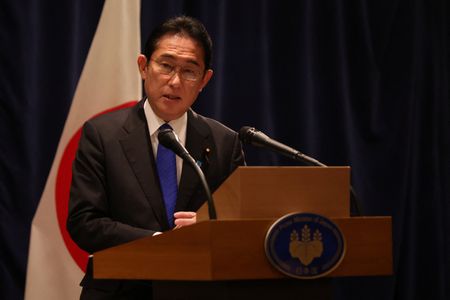By Kantaro Komiya
TOKYO (Reuters) -Japanese Prime Minister Fumio Kishida said on Friday that a return to deflation in the world’s third-largest economy cannot be ruled out, because domestic demand remains weak.
The comment came hours after data showed Tokyo’s consumer inflation, a leading indicator of Japanese price trends, hit a 42-year high in January, keeping the central bank under pressure to phase out its easy monetary policy.
However, Kishida told a session of the upper house of parliament that inflation was being driven by high global raw material prices and a weak yen, not by strong domestic demand.
Asked by an opposition lawmaker if the Japanese economy has fully exited from years of deflation, Kishida said: “the state of non-deflation is going on at the moment, but it has not reached a stage where we can judge that the return (to deflation) is unlikely.”
The Bank of Japan (BOJ) surprised financial markets last month with a decision to allow 10-year bond yields to move in a slightly wider range at just above or below zero, prompting speculation it was preparing the ground for a gradual exit from its super-loose policy.
But Kishida described the move as an operational tweak to smooth the impact of monetary easing, which is distorting the country’s bond markets. The BOJ did not make further changes at its mid-January meeting.
Policymakers are hoping that wage increases this spring will cushion higher living costs and boost consumer spending.
“The government and the BOJ have agreed to closely cooperate towards economic growth in tandem with structural wage hikes and the sustainable, stable achievement of the inflation target,” Kishida said, reiterating his previous remarks.
He also refrained from commenting on whether there would be a revision to a joint government and BOJ statement on economic policy that has mandated policymakers to fight deflation since 2013, saying that a new BOJ governor has not yet been chosen.
Kishida on Sunday said he would nominate the next BOJ leader next month before the incumbent Haruhiko Kuroda’s second five-year term expires on April 8.
(Reporting by Kantaro Komiya; Editing by Jacqueline Wong and Kim Coghill)

